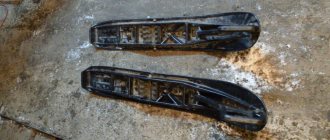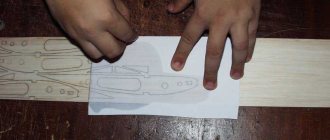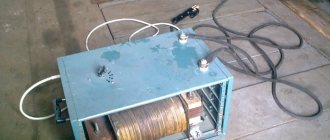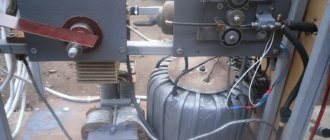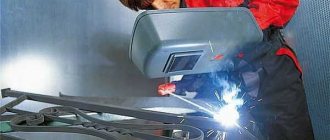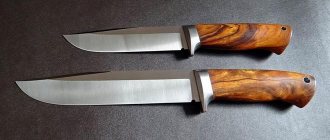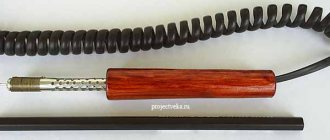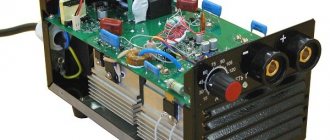The principle of spot welding is to join two metals under the action of an electric arc created by two movable electrodes (tips). High power electric current is supplied to them. When the electrodes are compressed at the site where the metal is pierced with an arc, a melt of a homogeneous structure is formed.
The spot welding method is often used in auto repair shops and private garages when body work is carried out. Very often, car batteries fail due to a broken contact; in order to change them, conventional soldering is not suitable; a stronger connection is needed.
Spot Welding Technology
The method is suitable for durable joining of heterogeneous alloys. Spot welding is called spot welding because of the size of the contact; it depends on the area of contact between the two tips or electrodes that form the electric arc.
To make spot welding, take two sheets of metal and a welding device. The process consists of several stages:
- the metal to be welded is placed between the tips, to which electric current is supplied;
- the power supply turns on;
- the stings connect with force;
- an electric arc occurs, it passes through metals, heats them up;
- Due to the compression force, the melt is compacted, resulting in a point connection of two sheets of metal.
The strength of the connection depends on the compression force of the tips, the power of the arc and the area of the tangent surface of the tips. They are made from alloys of high electrical and thermal conductivity; non-ferrous metals based on copper have such properties.
Why buy a welding holder separately if it is already included with the welder?
Beginning welders often ask the question: “Why buy separately holders for a welding machine if the inverter is already equipped with a clamp?”
The standard holder from the inverter is broken
The answer to this question is quite simple: such an electrode holder is of low quality, and accordingly it will not work for long. In addition, unscrupulous manufacturers often use cheap materials to make components for the inverter. This has a positive effect on price and a negative impact on quality. Most often, the clamping jaws fail; they burn out and no longer provide fixation of the rod.
Equipment
Ready-made machines for spot welding are either stationary or portable; they are convenient to use when carrying out repair work. Automatic welding machines are used in industry. There are portable lever welding devices called tongs.
Welding equipment is expensive, and you rarely need to use it. Craftsmen found a rational way out of the situation.
It is quite possible to make a spot welding device for batteries and a body yourself. It can be used to repair household appliances and create decorative metal products.
A good electrode holder should:
The electrode holder must meet the following mandatory requirements:
- Reliability and confidence in fixing electrical conductors of any diameter in the required position.
- Possibility of quickly changing the electrode exit angle.
- Good and complete contact .
- Ensuring quick electrode replacement.
- Durability of use.
- Lightness of the device.
- Insulation of live parts.
- Possibility of welding in hard-to-reach places.
Welding of small parts
Sometimes it can be problematic to attach small contacts: a regular soldering iron is not suitable for this; the connection obtained by tinning is very fragile and cannot withstand high dynamic loads.
You can spot weld two small contacts using a low-power mini-welder. It is made according to the same principle as pliers, only the lower handle of the clamping device is permanently fixed, only the upper one moves.
The current source is fixed on a dielectric base, it can be:
- tree;
- plywood;
- non-flammable plastic;
- textolite
A transformer from a microwave oven or a ready-made TR1 is suitable as a current rectifier. If a transformer from a microwave oven is used, a wire with a cross-section of at least 8 mm2 in a durable heat-resistant braid is used as an additional winding.
When selecting electrodes, it is important to compare their thickness with the size of the wire. D The ends of the electrodes are sharpened to the required size. The smaller the contact area, the stronger the connection.
- DIY fan: how to make a homemade powerful fan. Basic parameters and properties of fans (130 photos)
- Why do you need a security alarm, what functions does it perform?
How to choose winter workwear and not make a mistake - recommendations from the pros
The following is used as an electrode for spot welding:
- soldering iron tips;
- solid brass products (rods, hexagons, capillary tube);
- rods made of cadmium chrome bronze.
When choosing a lever, take into account the length of the working area - this is the depth to which the welded metal can be inserted into the welding device. To attach the tip to the handle, terminals are used: current is supplied to one end, the other part is secured with a self-tapping screw.
To select the correct pulse time, a resistor is included in the electrical circuit of the power supply. The power button is located on the handle or fixed on the power supply box. The wires and housing can be hidden in a single electrical insulator housing.
Popular manufacturers
Let's move on to popular manufacturers of electrode holders.
Telwin is a world leader in welding machines, cutting systems and chargers. The Italian company offers holders under the same brand.
Spring electrode holders for welding work from the German company ABICOR BINZEL are distinguished by the following characteristics: high-strength and heat-insulating handle; rigid fixation of the dynode in four positions; ergonomics; strength; versatility of use.
Trafimet was founded in 1974 in the Italian city of Vincenza . The manufacturer offers spring-type tools with the following technical parameters: low weight of the unit; reliability; ease of use.
The Russian company produces inverter equipment. Holders from this manufacturer are manufactured in compliance with all state standards; allow welding in all positions, as well as in hard-to-reach places.
Read also: Sus 304 stainless steel
The Swedish concern
ESAB is one of the world leaders in the production of equipment, materials, accessories, protective equipment and other accessories for welding.
The wide range also includes screw-type electrode holders, characterized by maximum safety and quality of work. See the video above. EWM 's head office and production are located in Mündersbach, Germany. The company specializes in the manufacture and sale of a wide range of equipment, including electrode holders of various types.
The Russian brand BRIMA occupies one of the leading positions in the market of equipment, components and materials for welding. Electrode holders are designed for three groups of consumers: household, professional and industrial.
SANTOOL a reliable manufacturer and supplier of quality welding products. The equipment is produced under several brands. The devices have a reliable fixation, electrically conductive parts are insulated from accidental contact.
The Russian company Skrab sells products under its own brand of the same name, and also supplies professional equipment from leading manufacturers. The equipment is used in many fields of activity.
SIBRTECH is a domestic manufacturer of high-quality tools and equipment. The company offers clamp-type electrode holders. When working with units, it is important that the electrically conducting parts do not come into contact with the product being welded or with human hands. regarding the products of this manufacturer , watch the video above and below .
The Italian company Quattro Elementi is engaged in the manufacture and sale of equipment, materials and accessories. Ergus brand .
Kord company is the largest Russian manufacturer of innovative equipment and accessories for welding. The clamps presented in the assortment are created in accordance with GOST standards and have different types of design.
In 2014, the Moscow company opened its own production of electrode holders and grounding terminals under the Saturn . The clamps are easy to use and are ideal for both domestic and professional level welding inverters.
Battery device
A do-it-yourself mini-spot welding device is made using a car battery. Its power is enough to weld a contact to another one that requires restoration.
Two brass or bronze rods are attached to a block with a copper alloy terminal block; they are insulated in the area of contact with the hand. It must be taken into account that during welding the rods will become very hot; the insulator-connector should not melt.
The disadvantage of this device is the lack of a switch and high battery power. You must work with the device carefully so that there are no burns in the contact area.
How to choose an air conditioner for your home or apartmentDo-it-yourself bait - composition, application features and storage methods (115 photos and videos)
- DIY sliding gates - how to build simple and automatic gates. Schemes, drawings and review of the best ideas (90 photos)
Factory made holders
- Collet; Quite a convenient option. Replacing the cinder with a new electrode is effortless. Looks aesthetically pleasing. Advantages : ergonomic handle, excellent protection of the welder from temperature and electrical influences. The disadvantage is the high cost and restrictions on the maximum welding current. Do not leave a short stub - there is a high probability of damaging the handle.
- Clothespin; The most common factory design. Available in a variety of sizes, for any welding currents and electrode diameters. It’s not very convenient due to the protruding lever, but the reliability makes up for the ergonomic shortcomings. Advantages - there are practically no current restrictions, very reliable contact with the electrode, no additional equipment is required to change the cinder. The disadvantage is the bulky design; installing a new electrode requires a lot of force.
- Fork (trident). The most famous and popular option, especially for welders of the old Soviet school. At the same time, it is the most controversial design. Today it is not available for sale; only old copies can be found on the secondary market. The reason is prohibited by safety standards due to the high probability of getting radiation burns to the eyes. Advantages : phenomenal simplicity of design. Disadvantages : high incidence of injuries, poor contact with the electrode, additional equipment is required to remove the cinder.
DIY spot welding photo
Contactor from a welding transformer
Such equipment can be turned into a full-fledged resistance welding tool. The only drawback is the inability to control the current strength.
Drawing development
The correct choice of circuit helps to produce a working welding machine. Preference is given to simple drawings that include a minimum number of parts and blocks. Such options do not allow you to create an overly powerful device, but the device is sufficient to perform minor repairs on a car, garden equipment, and fences.
We recommend reading Description of resistance spot welding technology
List of parts and consumables
To convert a welding transformer into resistance welding equipment, you will need the following elements and materials:
- a transformer that converts electrical energy;
- thick cable;
- copper electrodes;
- bolts;
- tips;
- breaker;
- wooden blocks, plywood to create the body.
The process of creating a device
The homemade device is assembled as follows:
- The welding transformer is installed in a housing made of metal sheets. The electrical board is assembled on a textolite sheet more than 1 cm thick. The part is fixed in the body of the welding machine.
- A welding wire is bolted to the busbar and secondary winding. The remaining end of the cable is connected to the electrode.
- The power wire is connected to the contact block located on the electrical board.
Spot Welding Operation
A master using a contact transformer apparatus must stand on a rubber mat and use protective gloves and goggles. The grounding cable is connected to the part to which another workpiece will be welded. After this, press the power key, compare the elements to be connected, and clamp with the electrode of the welding gun.
5 seconds after the start of the impact, the rod is transferred to the next point.
